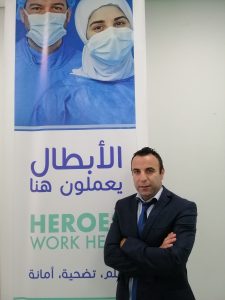
Lebanon-based Rafik Hariri University Hospital specialises in hospitalisation and medical services by ensuring care in an academic frame. The hospital offers academic training to young doctors, nurses, pharmacists, and dietitians through affiliations with several universities.
Even before the onset of the COVID-19 pandemic, the hospital was already on a digital-first trajectory, having deployed upgraded state-of-the-art data centres featuring latest servers and storage; and had installed advanced PACS Systems. It is also served by a fully automated medical information system and electronic patient health record. The hospital additionally provides remote medical services through telemedicine offerings.
Abbass Bassam, IT Manager, Rafik Hariri University Hospital, said, “The pandemic further pushed us to continue our digital endeavour and implement innovative virtual solutions for the safety of our patients and employees.”
Rising to the challenge
The emergence of the pandemic has led to unprecedented challenges across all segments of society. It has been especially demanding for healthcare institutes and providers. In addition to patient care, it poses unique challenges to the clinical clerkship model, where resident doctors attend rounds with an attending physician on a daily basis.
“However,” Bassam said, “with the outbreak of Coronavirus pandemic, it became a safety hazard to have groups of people gathered around in close quarters. As a teaching hospital, we had to urgently find a solution to address this issue so as to not cause disruption to the clerkship learning environment for students.”
Besides this, the hospital was increasingly finding it difficult to stay in touch with staff using its existing outdated pager systems. Often, the paging devices would break down, or messages would be lost in transit, paving the way for miscommunications and errors, which could prove to be fatal in the healthcare space.
“The creation of a platform for doctors, nurses, and clerks to communicate quickly and efficiently is very important. Every second matter in a life-saving situation,” said Bassam.
As the IT Manager, Bassam and his team decided to double down on their digital efforts and move to an advanced and modern communications system.
Going digital
Having already experienced the unparalleled expertise of Mitel in previous projects, Rafik Hariri University Hospital selected the vendor’s mobile-first unified communications and collaboration solution – MiCollab. Designed for today’s fast-paced, mobile workplace, the solution was perfectly in line with what the hospital was looking for, according to Bassam.
By choosing MiCollab, Rafik Hariri enabled its employees to connect, communicate and collaborate across any environment, quickening decision-making processes among other benefits.
The advanced enterprise communications solution offers a single application for voice, video, messaging, presence, audio conferencing, mobility, and team collaboration. This allows for consistent and seamless conversations across devices and environments.
“While we had greatly progressed in terms of our digital objectives, the COVID-19 pandemic made us further realise the importance of being able to communicate and collaborate effortlessly on digital platforms,” explained Bassam.
Results
“Thanks to Mitel’s MiCollab solution, we now have a lot more visibility on the whereabouts of our resident doctors and nurses,” he said.
The MiCollab solution also allowed the attending physician to evaluate and educate resident doctors on a patient’s case remotely through a video conferencing app on the iPad. This way, the hospital was able to restrict the interaction between resident doctors and patients, ensuring a safe environment.
“We are also in the process of implementing Microsoft’s mixed reality smart glasses HoloLens to enhance this environment further and add more value to the teaching process,” said Bassam.
The hospital also upgraded its telephones to Mitel’s latest digital and IP phones.
“We could now connect with all staff through a mobile app, even if they were outside the hospital premises,” Bassam said. “And what’s more – we also have considerably reduced our telephone invoices by around 70%, which otherwise used to amount to huge figures calling out-stationed residents.”
Rafik Hariri University Hospital has undergone a massive transformation not just with its communication system but its whole IT infrastructure in the past six months. With innovation at the heart of its transformation, Rafik Hariri has always been ahead of the curve in digital solutions within the country. It was one of the first hospitals in Lebanon to install thermal cameras at its entrance gates to monitor temperatures of anyone entering its premises without any hassle.
“COVID-19 forced us to make decisions very quickly to ensure everyone’s safety,” said Bassam. “We also installed a facial recognition system to allow employees to check-in and check-out without touching any machines. Previously, we were using a fingerprint system. In light of the pandemic, we had to innovate. We also introduced a separate mobile app that uses Google Maps to help with employee check-in and check-out of the premises.”
The hospital has also introduced a monitoring room that allows doctors to see everything they need in isolation rooms without going in.
The hospital also revolutionised its IT systems keeping patients as a priority. It upgraded its Wi-Fi to faster speeds in in-patients’ rooms to make sure they are comfortable and connected.
“We also created a smart app, which made it easy and quick for patients to receive their lab, blood work and other results. We introduced wireless telemetry for assessing patients’ vital signs periodically and having the data automatically sent to the main system. We even have robots to deliver food to patients, limiting human interactions to control the spread of the pandemic. This is an area which we will continue to work on and enhance.
“All of this is still only a fragment of what we actually achieved in the past few months. We have also deployed a cloud and AI system that uses AI to analyse a larger number of CTs with fewer physicians, where you upload CTs that automatically detect the existence of COVID-19 within two minutes. We have created a tracking system for PCR test results and introduced a passport reader to make registrations faster for COVID-19 patients,” said Bassam.
He also reiterated the importance of staying updated and regularly upgrading to the latest technologies. With no plans to rest on its laurels, the IT manager said the next item for Rafik Hariri on its digital agenda is to create an application for COVID-19 contact tracing and further develop the potential with Microsoft’s HoloLens.










Discussion about this post